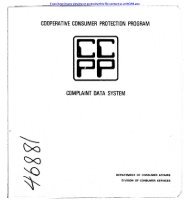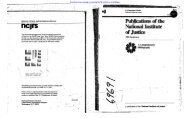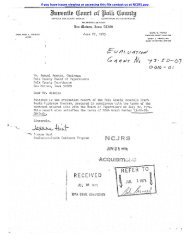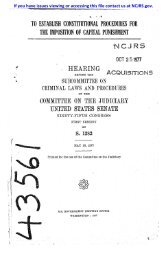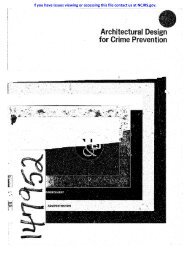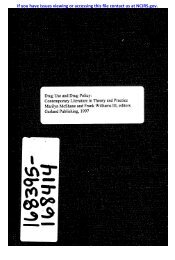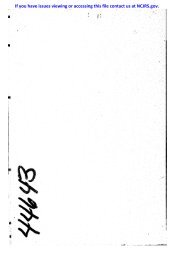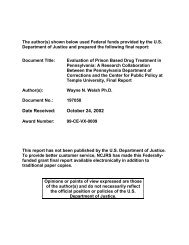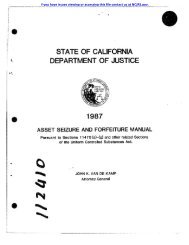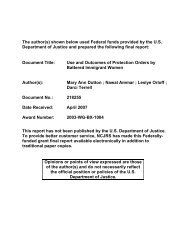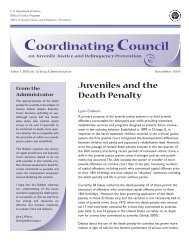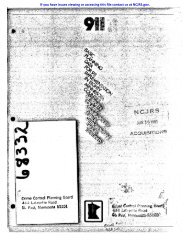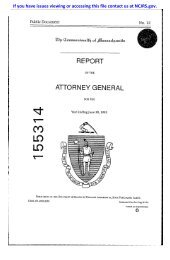Conflict Resolution Education - National Criminal Justice Reference ...
Conflict Resolution Education - National Criminal Justice Reference ...
Conflict Resolution Education - National Criminal Justice Reference ...
You also want an ePaper? Increase the reach of your titles
YUMPU automatically turns print PDFs into web optimized ePapers that Google loves.
♦ What strategies did students use to manage<br />
conflicts prior to program training?<br />
Before training, students generally managed their<br />
conflicts in one of three ways: verbal or physical<br />
abuse, teacher intervention, or withdrawal from<br />
the conflict and the other person. A teacher stated<br />
in her log, “Before training, students viewed conflict<br />
as fights that always resulted in a winner<br />
and a loser. To avoid such an unpleasant situation,<br />
they usually placed the responsibility for resolving<br />
conflicts on me, the teacher.” Students did<br />
not know how to engage in problem resolution<br />
or integrative negotiations.<br />
♦ Did the program training successfully teach<br />
students negotiation and mediation procedures?<br />
After the training ended, students knew the negotiation<br />
and mediation procedures and retained<br />
this knowledge.<br />
♦ Could students apply the negotiation and<br />
mediation procedures to conflicts?<br />
For the three measures used (written responses<br />
to conflict scenarios, oral responses to conflict<br />
scenarios given in an interview, and role-playing<br />
responses to conflict scenarios that were videotaped),<br />
students were able to apply the negotiation<br />
and mediation procedures to various conflicts.<br />
♦ Did students transfer the negotiation and mediation<br />
procedures to nonclassroom and nonschool<br />
situations?<br />
The findings showed that students used the negotiation<br />
and mediation procedures in the hallways<br />
and lunchroom as well as on the playground.<br />
They also used the procedures in family settings.<br />
♦ Did students rely on “win-lose” strategies or negotiation<br />
strategies when presented with an option?<br />
After completing the program training, students<br />
were placed in a negotiation situation that presented<br />
the opportunity either to win or to maximize<br />
joint outcomes. Although untrained students<br />
frequently tried to win, the majority of trained<br />
students focused on maximizing joint outcomes.<br />
68<br />
♦ Did the program training increase overall<br />
academic achievement?<br />
In three of the studies, the training was integrated<br />
into English literature units. While studying a<br />
novel, students learned the negotiation and mediation<br />
procedures, which were applied to the<br />
dynamics among the major characters. At the<br />
conclusion of the unit, students were given an<br />
achievement test, and several months later they<br />
were retested. The results indicated that the students<br />
who received the integrated training earned<br />
significantly higher achievement and retention<br />
test scores than the students who studied the novel<br />
but did not learn conflict resolution procedures.<br />
♦ Did the program training result in fewer discipline<br />
problems that required teacher and administration<br />
management?<br />
During the studies, the number of discipline<br />
problems requiring teacher management decreased<br />
by approximately 80 percent, and referrals<br />
to the principal were reduced to zero.<br />
♦ Did the program training create more positive<br />
attitudes toward conflict?<br />
Untrained students uniformly had negative attitudes<br />
toward conflict. After training, students<br />
developed more positive attitudes toward conflict.<br />
Teachers, administrators, and parents believed<br />
that the Teaching Students To Be Peacemakers<br />
program was constructive and helpful. Many<br />
parents whose children did not participate in the<br />
project requested that their children receive the<br />
training in the upcoming year. A number of parents<br />
also asked if they could receive the training to<br />
improve conflict management within the family.<br />
Other Research<br />
Additional assessment of the conflict resolution education<br />
field supports the need for conflict resolution<br />
programs and legitimizes the contention that effective<br />
programs must be based on proven negotiation theory,<br />
which can be translated into instructional procedures<br />
that educators can use in the classroom. The following<br />
items highlight some of the findings of this research:



